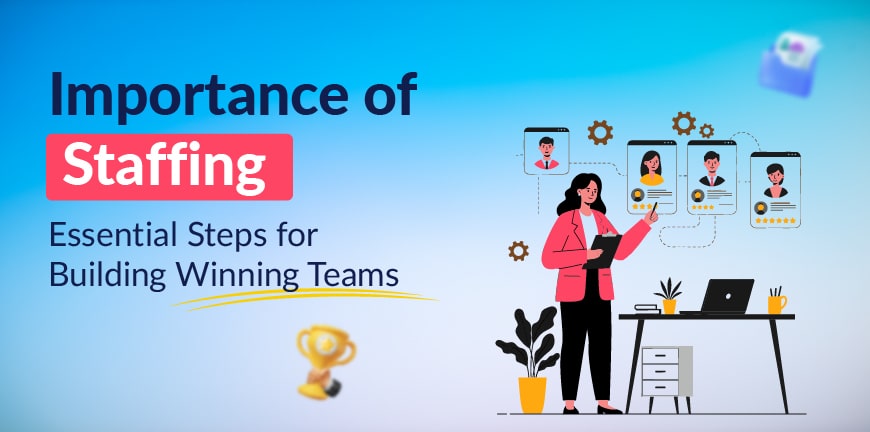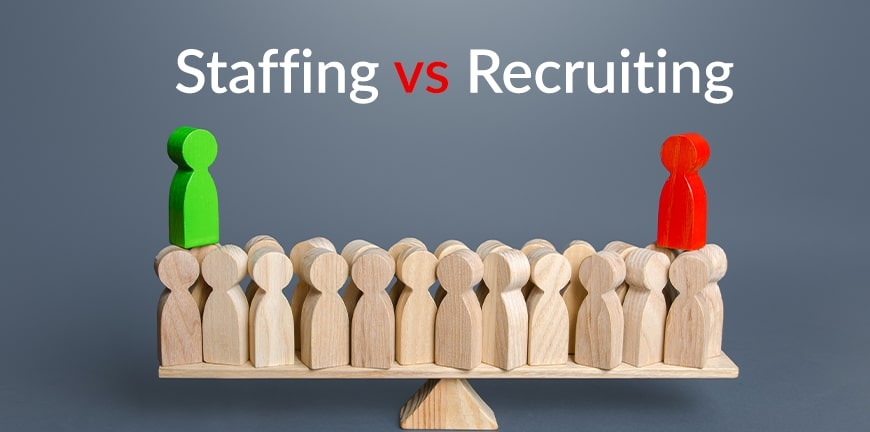
What is the Importance of Executive Search
19/09/2025
7 Essential Compliance Management Activities
19/09/2025- Understanding Staffing and Its Role
- What is Staffing in Management?
- Why Staffing is a Core Function of HR?
- The Need for Staffing in Modern Organizations
- Key Benefits of Effective Staffing
- How Staffing Builds Winning Teams? Step-by-step
- What is the Strategic Importance of Staffing?
- Conclusion
- Frequently Asked Questions
Staffing plays a crucial role in today’s competitive business environment. Human resources are a company’s most valuable asset that directly influences the efficiency of operations, growth, and sustainability of an organisation. Businesses experience fewer problems and greater teamwork when the right people take the right positions, so they create a foundation for success.
The importance of staffing goes beyond filling positions—it focuses on sourcing, screening, hiring, and managing the best talent to handle everyday business tasks and achieve organisational goals. This article explores why modern organisations need proper staffing and how it builds winning teams. Readers will find the core benefits of effective staffing processes, ways to align skills with business objectives, and how proper staffing helps organisations remain competitive while building long-term resilience.
Understanding Staffing and Its Role
Staffing is the process of finding, hiring, and managing qualified people for specific positions. The process involves identifying workforce needs, creating job descriptions, recruiting candidates, and placing the right people to achieve business goals.
What is Staffing in Management?
Staffing in management is a systematic way to acquire, deploy, and retain skilled
employees. The management team evaluates knowledge and capabilities before assigning specific roles. This function involves recruitment, selection, training, development, and performance management of team members. Every manager at all levels handles staffing tasks to individuals throughout the organisation’s lifetime to meet growing business needs.
Why Staffing is a Core Function of HR?
HR relies on staffing as its foundation to acquire and manage human resources. HR teams use this function to optimize personnel based on what the organization needs. It also creates a framework for employee development, performance assessment, and compensation planning. The process helps companies comply with labour regulations and protects them
from legal disputes and penalties.
The Need for Staffing in Modern Organizations
The digital world has made staffing more important than ever. The new technology and changing customer needs have made hiring and retaining talent more important.
Staffing helps companies keep up the pace of their operations in this dynamic market by helping them maintain a mix of full-time, part-time, and temporary employees.
The function improves organisational performance by placing skilled people in key roles, optimising efficiency and productivity. This approach encourages a positive work environment where employees’ roles line up with their skills and abilities as well as personal goals. It even results in higher job satisfaction and lower turnover rates.
Key Benefits of Effective Staffing
Staffing brings clear advantages that affect an organisation’s bottom line. The benefits range from talent acquisition to risk mitigation and building a foundation for lasting business success in the marketplace.
1. Helps find and retain top talent
Finding and retaining the best performers remains the biggest challenge today. About 93% of
organizations globally worry about employee retention. However, with the right staffing processes, businesses can find candidates whose qualifications, skills, and experience align with the job requirements perfectly.
Better candidate selection increases the chances of hiring candidates who will stay with the organization for their stated period or longer durations. Companies with low voluntary turnover (10% or less) are 18% more likely to show high overall organizational performance.
2. Improves productivity and efficiency
When the right people are in the right roles, productivity and performance are naturally enhanced. These employees make fewer mistakes and facilitate better workflows as their responsibilities match their skillsets. In such cases, organizations can assign ambitious targets to candidates as they work at their full potential. Research shows that engaged employees are 12% more productive, which proves the value of matching talents with the right roles.
3. Boosts employee satisfaction and morale
Good staffing creates a work environment where skills line up with career goals. Employees
can use their strengths, perform at their best potential, and find fulfilment in their roles.
Conducting performance reviews and recognition programs acknowledges employee contributions, strengthening their sense of belonging. Lower absenteeism and turnover rates follow as a result.
4. Reduces operational risks and errors
The right staffing process reduces business risks as there is careful candidate selection. Companies see fewer errors, better efficiency, and need less supervision when qualified professionals take the right positions. Workflows are smooth with less downtime and better service delivery. Operational costs drop while business performance rises.
5. Supports compliance and legal safety
Today’s complex environment makes compliance essential. Staffing companies ensure that they implement a staffing process and hire individuals by keeping up with regulatory changes and meeting all legal requirements. Proper staffing protects companies from penalties and lawsuits as staffing providers verify job applicants’ credentials and handle employee disputes. A well-regulated HR framework ensures fairness and reduces discrimination risks.
How Staffing Builds Winning Teams? Step-by-step
Building winning teams takes more than just filling positions—it needs a strategy that aligns with the company’s vision and promotes an environment where employees thrive. The right staffing approach acts as the lifeblood of management strategies and deploys the right people in the right roles where they make the biggest difference.
1. Aligning skills with business goals
Smart staffing strikes the right balance between workforce capabilities and the company
objectives. Companies that match their people strategy with business goals see betterr
financial results.
A complete skills inventory that the staffing approach incorporates helps understand the current capabilities of the organization. This helps companies spot critical roles that deliver exceptional value, as research shows top performers in these vital positions deliver 800% more productivity than average performers.
Assessing their workforce needs against business objectives beforehand helps companies allocate resources well. And this is what staffing facilitates.
2. Making collaboration work
The right staffing promotes teamwork. Companies with a culture of collaboration are five
times more likely to perform better. Teams work best when everyone believes that combining their unique skills leads to better results.
Trust acts as the lifeblood of working together—employees at high-trust companies show 74% less stress, 50% higher productivity, and 76% more engagement. Companies can foster stronger collaboration by sharing knowledge and establishing clear channels of communication between departments.
3. Making innovation happen through diversity
Teams with different backgrounds not only bring in fresh perspectives but also make amazing breakthroughs. Research shows diverse teams are 1.7 times more innovative than their competitors.
Companies with both natural diversity (traits people are born with) and learned diversity (traits gained from experience) are 45% more likely to grow their market share. The staffing approach is a strong proponent of hiring diverse teams, as diversity is more than just demographics—it covers different views and experiences that challenge what we think we know and spark new ideas.
4. Better team results with smart hiring
Building winning teams comes down to strategy and growth. Great teams focus on getting
outstanding results through trust and shared goals. Employees are 3.2 times more likely to
participate when their personal goals match company objectives.
Good staffing facilitates clear career paths for employees and ways to recognise their contributions. This helps in creating strong teams that result in long-term success.
What is the Strategic Importance of Staffing?
Staffing has evolved beyond an operational function today. It has become a vital business strategy. Modern organizations now face unique challenges that require sophisticated human capital management approaches.
1. Adapting to market and technology changes
Technology continues to alter work requirements, creating a skills gap that affects many
industries. Global workforce projections suggest 75-375 million people might switch their
occupational categories and acquire new skills by 2030.
Automation could displace 400-800 million workers. Smart staffing helps companies embrace these transitions through flexible talent pools and employee upskilling programs. Many businesses now create mutually beneficial alliances with educational institutions to equip workers with market-relevant skills.
2. Optimizing human resource costs
Small companies spend about 56.9% of their operating expenses on personnel. Cost
optimization becomes vital in this context. Experienced staffing approaches reveal an
interesting metric – each additional year of employee tenure generates INR 106.32 in
revenue per dollar spent on total rewards. This data explains why HR departments
prioritize retaining top performers to optimize costs.
3. Building long-term organizational resilience
Companies displaying healthy, resilient behaviours survived economic downturns better. The
data shows resilient businesses increased their earnings by 10% during the last economic
downturn while their competitors dropped by 15%. These organizations typically let small
cross-functional teams close to customers make key decisions. They also promote
psychological safety and create learning environments where calculated risks promote
innovation.
Conclusion
Good staffing is vital for business success in today’s changing world. This article showed how it improves efficiency, teamwork, and long-term strength. Smart staffing brings many benefits—from better hires and growth to happier workers and lower risks.
Great teams form when skills align with goals and diverse individuals work well together. Smart companies view staffing as a long-term investment and adapt the same as business changes. This makes them stronger and ready for the future.
Successful companies know people are their biggest asset. They invest in hiring, training, and keeping top talent. This creates a positive cycle of growth that helps them overcome challenges and thrive.
Frequently Asked Questions
1. What is the importance of staffing in modern organisations?
Staffing ensures organisations scout & hire the right talent, retain skilled teams, reduce gaps, boost efficiency, foster growth, & maintain competitive success.
2. How does staffing improve productivity and employee satisfaction?
Effective staffing places the right people in the right roles, reducing workload stress, improving motivation, boosting engagement, & enhancing productivity organisation-wide.
3. What key benefits of staffing are offered by Alp Consulting?
Alp Consulting provides major benefits like cost efficiency, faster hiring, improved workforce quality, talent alignment, compliance, and scalable recruitment support.
4. Why does Alp Consulting consider staffing a core function of HR management?
Staffing drives organisational stability, talent availability, workforce planning, strategic decision-making, employee development, retention, & long-term HR value creation.
5. What role does staffing play in aligning talent with business goals?
Staffing identifies suitable competencies, matches employee skills to organisational objectives, supports strategic planning, & drives targeted business growth.
Contact Us For Business Enquiry

Kasthuri R
Kasthuri R is the Co-Founder & Executive Director at ALP Consulting, bringing over 23 years of experience in search, staffing, and HR consulting. She has been instrumental in driving ALP’s recruitment, employee leasing, and executive search practices across diverse industry verticals. With deep expertise in talent acquisition, HR strategy, and operational management, Kasthuri has built scalable, client-focused solutions that enhance workforce efficiency. Her strategic leadership continues to steer ALP Consulting toward innovation and excellence in people management.




